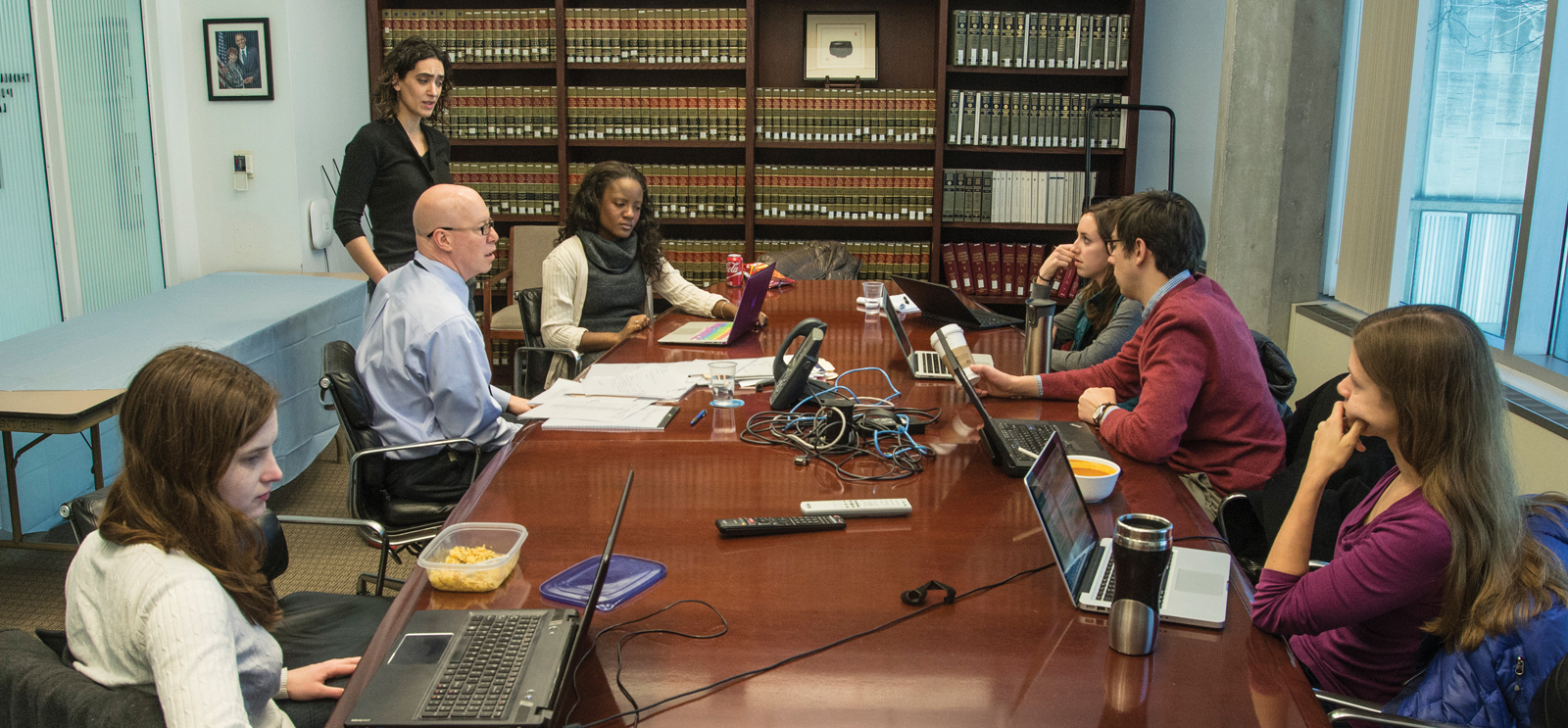
Craig Futterman meets with students in the Civil Rights and Police Accountability Project at the Law School. (Photography by Lloyd Degrane, courtesy the University of Chicago Law School)
Craig Futterman and his students work to make police departments more transparent, starting in Chicago.
In March 2014 clinical law professor Craig Futterman and his students in the Law School’s Civil Rights and Police Accountability Project won a stunning legal victory when an Illinois appellate court ruled that the Chicago Police Department’s misconduct records be opened to the public. It was a watershed moment. Thousands of documents that Futterman and his students had sought, files pertaining to citizen claims of police abuse, were suddenly available for anyone to access. They revealed what Futterman called a “broken system” that for decades had allowed abusive officers to act with impunity.
Futterman knows that system well: in 2000 he founded the Civil Rights and Police Accountability Project at UChicago, the first of its kind in the nation. In the years since, he has worked alongside hundreds of law students, coaching them as they strive to free clients falsely accused of crimes and as they litigate—and very often win—civil lawsuits over false arrests, kidnappings, beatings, and other civil rights violations by police.
The appellate victory in Kalven v. Chicago, a Freedom of Information Act lawsuit filed on behalf of Hyde Park journalist and activist Jamie Kalven whose success opened up the misconduct records, was the culmination of a 10-year litigation fight for Futterman and his students. But he is careful never to call it an ending. “I don’t want to diminish it—this is real reform,” he said in August 2014, “but by itself it doesn’t fix the system. By itself it doesn’t end abuse; it doesn’t end racism; it doesn’t end the police code of silence.”
Fifteen months later, Futterman is on the verge of that next step. He and his students will return to the courtroom to defend the Kalven decision. In December 2014, as city officials prepared to hand over a complete list of abuse allegations from 1967 to the present—“a staggering, unprecedented amount of information,” Futterman says—the police officer advocacy organization the Fraternal Order of Police secured a temporary injunction barring the release of any records dating back farther than four years. Now it is seeking in court to have that older data destroyed, citing collective bargaining agreements between the city and the police union. Futterman and his students are fighting that effort. “You can’t privately agree to keep secret what the law requires you to share,” he says.
In late October Futterman and Kalven launched an open database to collect and organize police misconduct information. The database, accessible at cpdb.co, currently includes 54,581 complaints for 8,337 officers during the periods May 2001 to December 2008 and March 2011 to March 2015—records obtained in the Kalven lawsuit and by a series of FOIA requests filed in the wake of the decision. Futterman and Kalven plan to add more records as they become public. “Now we can have honest conversations with common data sets, common pools of information—the department’s own information,” Futterman says. “This fundamentally redistributes power.”
The clearinghouse, as Futterman calls it, allows users to analyze misconduct information by geography—neighborhoods, wards, police districts, and schools—and by category of complaint. Users can see which officers are implicated together in alleged abuse. They can also see digital copies of the original documents. One unmistakable finding, says Kalven, is that a tiny fraction of officers provoke most of the complaints. Some accumulate them by the dozens, to little or no consequence. The vast majority of other officers, by contrast, have between zero and four.
Futterman hopes the database will foster an “ethos of sharing” among lawyers, journalists, researchers, and others who come into possession of police records through their own FOIA requests. “We hope people will contribute the documents they obtain, and help make the database more and more robust,” he says. Wide and free access was the original intent of the lawsuit, Kalven adds: “We’re not proprietary about any of these documents. When we said public, we meant public.”
Futterman also hopes to encourage more police officers to report their own concerns about abuse. The database includes a function that allows people to share information with the clinic confidentially. “What police departments don’t do is protect officers from retaliation when they break the code of silence,” Futterman says. He offers an example of the difference it can make when police officers do speak up: the case of Laquan McDonald.
In October 2014, McDonald, a 17-year-old African American, was shot and killed by a police officer in the Chicago Lawn District on the Southwest Side. McDonald was shot 16 times, and the incident was captured by another police car’s dashboard camera. Representing an independent journalist named Brandon Smith, Futterman and his students have filed suit to have the video released to the public. He has not yet seen it, but confidential sources within the city alerted him to its existence and described what it shows, he says, as “an execution.” Investigating the incident further, he and his colleagues interviewed other witnesses who corroborated that description. (The Chicago City Council approved a $5 million settlement with McDonald’s family before a lawsuit was filed.)
In April the US attorney’s office announced a criminal probe, which could result in the first-ever criminal prosecution of a Chicago police officer for an on-duty shooting. Crucial information that fueled his investigation, Futterman says, came from law enforcement officials who “stuck their necks out and had the courage to report abuse,” he says. “The database will provide the means for others to do so with less personal risk. … This is something that can fundamentally transform policing and the relationship between police and communities.”
